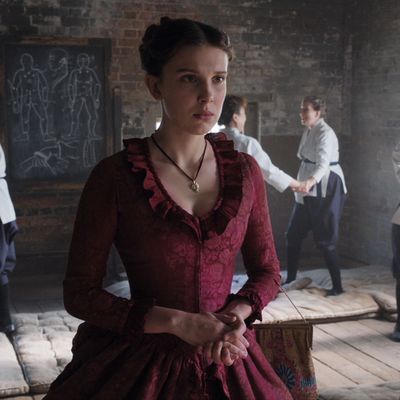
It will come as no surprise to anyone to learn that Sherlock Holmes’s headstrong teenage sister, Enola Holmes, doesn’t show up anywhere in Arthur Conan Doyle’s original stories or novels; the character was created by novelist Nancy Springer in 2006. Doyle himself was a compassionate and occasionally progressive fellow, but he also had a Victorian fondness for propriety and empire. Despite decades and decades of imitators, attempts to mimic his Holmes tales or expand their dramatis personae usually fall flat because they never quite achieve his peculiar, orderly sensibility. I haven’t read Springer’s books so I can’t speak to her work, but luckily, Enola Holmes the movie doesn’t even try to feel like a Sherlock Holmes story. It’s smart enough to be very much its own thing, and that thing very much belongs to its young star, Millie Bobby Brown.
As Enola, Brown brings a supercharged exuberance to the part of a 16-year-old who, after years of being home-schooled in literature, history, science, and combat by her independent-minded mother (Helena Bonham-Carter), discovers one day that dear old mum has gone missing. Upon returning home, her older brothers, superstar detective Sherlock (Henry Cavill) and establishmentarian fussbudget Mycroft (Sam Claflin), seem less interested in their parent’s whereabouts than in the fact that Enola hasn’t been going to school, where she would of course learn things like proper posture and how to be a good wife. (Mycroft is outraged, while Sherlock is amused.) We know of course that Enola — who breaks fourth walls with glee and regularly chats with the audience via comical asides — could never accept such a fate. Skilled in breaking codes and word puzzles, she discovers that mom has left her some money and clues, and she flees to London to track her down.
I’m not sure what constitutes a spoiler at this point, partly because the film plays so fast and loose with the story and its subplots that none of it really seems to matter. On the train to London, Enola runs into a handsome young lord, the Viscount Tewkesbury (Louis Partridge), who is fleeing from his family. She also learns about a controversial reform bill that’s set for a vote in Parliament (a matter that keeps coming up as a bit of background, so we know it will soon prove important to our story). In London, she pieces together additional clues and learns a little more about her mom’s secret underground activities. Will it all come together in the end? Uh, maybe. Sort of? I saw the movie twice and I’m actually still not sure.
Again, though, the narrative is merely window dressing. The real attraction here is Brown’s turn as Enola. The character’s insistent lightheartedness might seem easy to pull off, but it’s not: With her constant addresses to the camera — from an underwater wink while a baddie tries to drown her, to a cheekily grandiloquent reveal of her identity to us while she attempts to go undercover as a widow — Enola could get real annoying real quick. (The film was directed by Harry Bradbeer, also responsible for helming Fleabag.) What’s more, the levity often works against any tension the story might have generated. Nobody ever seems to be in any real danger, which makes this less an adventure and more a lark. We’re not so much worried about what might happen to Enola as what fun new thing she might say or do next. But Brown is wonderful, selling the film’s girl-power ethos with just the right amount of playfulness, while retaining something sweet and sincere at the character’s heart. She conveys the energy of a kid discovering the wide world; her Enola moves with seeming confidence but has the darting eyes of a child.
That’s not always enough to keep the film from sagging in parts. For starters, it seems to slow to a crawl whenever Enola is off the screen, which thankfully isn’t often. As the pretty-boy nobleman who becomes the object of our heroine’s fascination, Partridge is about as expressive as a radish. Cavill is a talented actor, but his ripped Sherlock — with his bulging muscles, powerful jaw, and Man of Steel cowlicks — isn’t really given anything meaningful to do, which I guess is kind of funny. Bonham-Carter is somehow both perfect for the part of Mother Holmes and, unfortunately, wasted. Perhaps we’re merely being set up for future adventures, in which these characters will presumably play greater parts. There are more Enola Holmes books, and Millie Bobby Brown’s performance is so delightful that I do hope Netflix makes more of these.
More Movie Reviews
- The Accountant 2 Can Not Be Taken Seriously
- Another Simple Favor Is So Fun, Until It Gets So Dumb
- Errol Morris Has Been Sucked Into the Gaping Maw of True Crime


